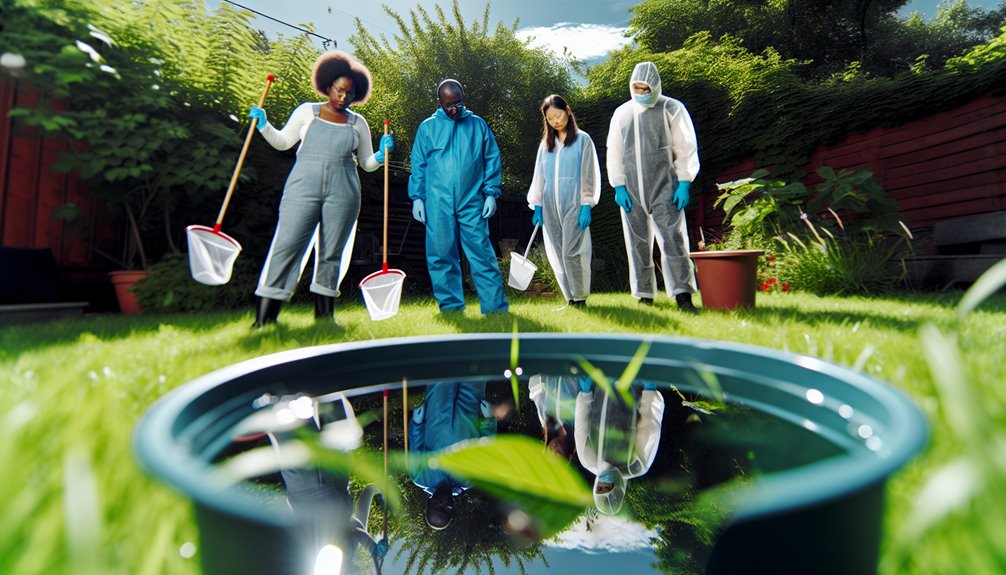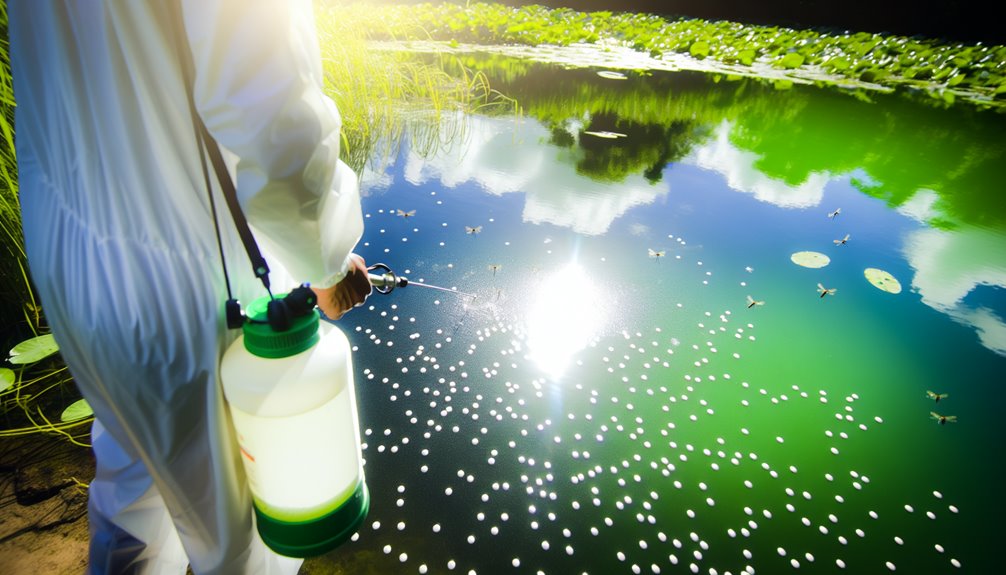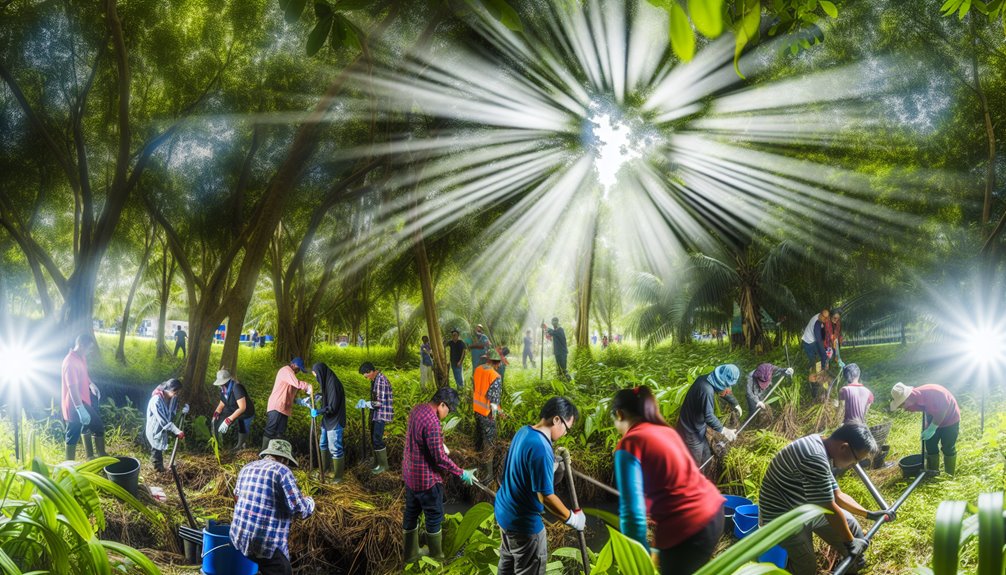When it comes to controlling mosquitoes long-term, professionals employ a multifaceted approach. You’ll find that strategies like eliminating standing water and introducing natural predators play essential roles. Additionally, techniques such as larviciding and targeted adult sprays are important. Understanding these methods can provide insights into effective management practices. But what about the role of community involvement and habitat modification? Exploring these aspects reveals an extensive strategy that goes beyond simple extermination.
Regular Elimination of Standing Water

One of the most effective strategies for mosquito control is the regular elimination of standing water, as even a small amount can serve as a breeding ground for these insects.
To minimize breeding sites, you should routinely inspect your property for areas where water accumulates. This includes checking gutters, birdbaths, and plant pots.
Implementing proper water drainage systems can drastically reduce these risks. If you discover standing water, you must promptly remove it or treat it accordingly.
Encourage your community to adopt similar practices, as collective effort amplifies results.
Biological Control Methods
While traditional methods of mosquito control often rely on chemical pesticides, biological control methods offer an environmentally friendly alternative that leverages natural predators and pathogens.
You can enhance your mosquito management efforts by introducing species like fish, dragonflies, and certain birds, which act as natural predators, preying on mosquito larvae and adults.
Additionally, employing microbial agents such as Bacillus thuringiensis israelensis (Bti) can effectively target mosquito larvae without harming beneficial insects.
These strategies not only reduce mosquito populations but also promote a balanced ecosystem.
Larviciding Techniques

Building on the principles of biological control, larviciding techniques provide targeted interventions to manage mosquito populations at their developmental stage.
These methods focus on applying larvicidal agents effectively to guarantee maximum impact on immature mosquitoes.
Here are four key application techniques you should consider:
- Water Surface Treatment: Apply agents directly to water bodies where larvae thrive.
- Granular Application: Use granular larvicides in areas with stagnant water for sustained release.
- Drenching: Treat soil or vegetation where mosquito larvae might develop in hidden water pockets.
- Aerial Application: Utilize aerial sprays for large-scale treatment in hard-to-reach areas.
Adult Mosquito Control Sprays
Effective adult mosquito control sprays are essential in managing mosquito populations and mitigating the risk of disease transmission.
When you select a spray, consider its residual effectiveness, which determines how long the product remains active on surfaces. This aspect is critical for ongoing control, especially in areas prone to high mosquito activity.
Application techniques also play an important role; using targeted methods, such as fogging or barrier spraying, can enhance coverage and maximize impact. Make sure you follow manufacturer instructions for best results.
Habitat Modification

Habitat modification plays an essential role in mosquito control by altering or eliminating breeding sites that support their lifecycle.
By thoughtfully engaging in landscape design and considering environmental factors, you can considerably reduce mosquito populations.
Here are four effective strategies:
- Eliminate Standing Water: Remove containers and debris that collect water, as they serve as breeding grounds.
- Improve Drainage: Guarantee proper drainage in yards and gardens to prevent water accumulation.
- Landscape Design: Use native plants that don’t require excessive watering, reducing moisture levels.
- Maintain Vegetation: Trim overgrown shrubs and grass where mosquitoes can hide during the day.
Implementing these strategies not only curtails mosquito breeding but also enhances your outdoor environment, promoting a healthier ecosystem for all.
Use of Mosquito Traps
While implementing habitat modification is essential for mosquito control, the use of mosquito traps provides an additional, effective strategy for reducing their populations.
To maximize trap effectiveness, you need to take into account various factors, including the type of trap, the species you’re targeting, and environmental conditions. Proper trap placement is vital; position traps in shaded areas, near breeding sites, or where you frequently notice mosquito activity. This strategic placement enhances the likelihood of attracting and capturing more mosquitoes.
Regular maintenance, such as cleaning and replacing lures, also boosts trap performance. By integrating traps into your control efforts, you’re not only reducing mosquito numbers but also contributing to a healthier community environment, ensuring greater comfort for everyone in your area.
Integrated Pest Management Strategies
Integrated Pest Management (IPM) strategies combine various approaches to control mosquito populations effectively and sustainably. By understanding pest behavior and fostering community involvement, you can create a thorough plan that minimizes reliance on chemical interventions.
Here are four key strategies to take into account:
- Source Reduction: Eliminate standing water where mosquitoes breed.
- Biological Control: Introduce natural predators, like fish, to manage larvae populations.
- Cultural Practices: Educate the community on proper waste disposal and landscaping techniques that deter mosquitoes.
- Monitoring and Assessment: Regularly evaluate mosquito populations and adjust management strategies as needed.
Implementing these IPM strategies not only protects public health but also encourages community participation in effective mosquito control efforts.
Conclusion
As the proud owner of Mosquito Eliminators of South MS, I understand how frustrating it can be to deal with those pesky mosquitoes invading your outdoor spaces. By implementing these long-term control strategies, you’re not only taking a stand against a nuisance but also contributing to a healthier ecosystem. I’m here to help you every step of the way! If you’d like to explore more effective solutions or have any questions, I invite you to visit us at mosquitoeliminatorsms.com or give me a call at (601) 336-2277. Together, we can create a mosquito-free oasis for you and your family to enjoy all summer long!

